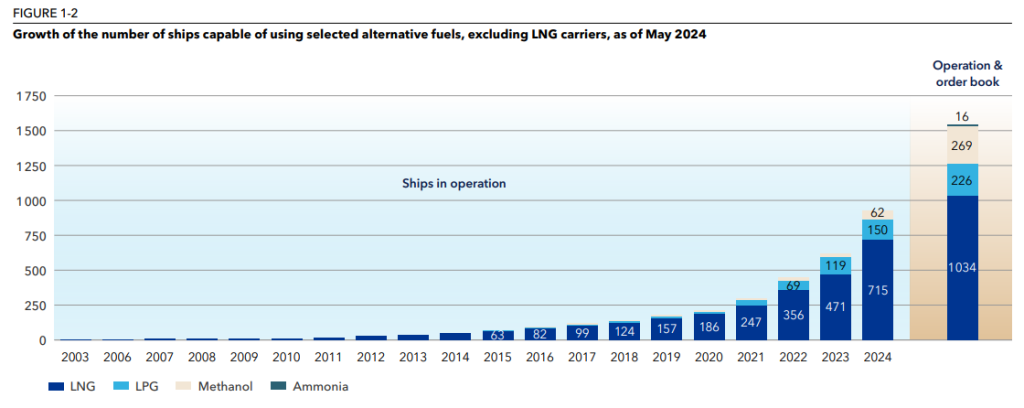DNV’s latest Maritime Forecast to 2050 report stresses that, until carbon-neutral fuels become viable, prioritizing the development and use of technologies that reduce energy consumption is crucial for lowering emissions.
According to the report, to reach IMO’s 2030 decarbonization goals shipping will need between 7 and 48 Mtoe of carbon-neutral fuels. However, with the global cross-sector production of carbon-neutral fuels expected to reach only between 44 and 63 Mtoe by 2030, it will be near impossible for shipping to secure its required share. As regulations like the EU Emissions Trading System (ETS) and FuelEU Maritime start to impose costs on emissions, shipowners and managers must therefore explore every option to reduce fuel consumption.
Key findings of the report
-
Decarbonization costs: Regardless of the decarbonization direction, significant costs are anticipated. Simulated scenarios project cost increases per transport work as follows:
- Bulk carriers: 69-75%
- Tankers: 70-86%
- Container vessels: 91-112%
-
Energy efficiency improvements: Reducing energy losses is the most straightforward way to cut emissions. Operational and technical energy efficiency measures can reduce fuel consumption by 4-16% by 2030. A 16% reduction in energy consumption would save 40 Mt of fuel and 120 MtCO2 emissions, equivalent to operating either the 55,000 smallest ships or the 2,500 largest ships with carbon-neutral fuel.
-
Onboard carbon capture (OCC): OCC is highlighted as potentially the most effective way to decarbonize, enabling the continued use of conventional fuels and technologies. However, CO2 handling infrastructure needs significant development.
-
Alternative solutions: Shore power and batteries are alternatives that can reduce reliance on costly carbon-neutral fuels. For example, shore power can cut the 7% of total energy consumption used by ships in ports by replacing onboard fossil fuel-generated electricity.
-
Role of digitalization: Digitalization plays an increasingly important role in enhancing operational and technical energy efficiency measures. Digital verification tools are essential for building trust, fostering industry-wide collaboration, and facilitating new contractual arrangements that incentivize energy savings.
Alternative-fueled vessel orders: Are they enough?
During the launch of the 8th edition of the Maritime Forecast to 2050 Webinar, DNV Maritime CEO, Knut Ørbeck-Nilssen, expressed concerns about the slowing pace of maritime decarbonization due to various challenges.
On one hand, nearly half of the current order book includes vessels equipped with dual-fuel capable engines. This indicates a significant step toward reducing shipping emissions and demonstrates that the industry is making progress.

However, the sector still faces considerable obstacles that are hindering further decarbonization efforts. The fact that 93% of the fleet still uses conventional fuels highlights the scale of the challenge.
The adoption of alternative fuels is hampered not only by high production costs but also by the need for extensive bunkering infrastructure that must be developed worldwide. Additionally, shipping is not the only industry competing for alternative fuels, which raises concerns about their future availability.
Methanol happy hour has ended
… stated the CEO
Reducing energy loss is the most straightforward way
According to the report, reducing energy losses is the most straightforward way for the global fleet to cut emissions. Operational and technical energy efficiency measures can reduce fuel consumption by between 4 and 16% by 2030. Reducing energy consumption by 16% for the world fleet would save 40 Mt of fuel and 120 MtCO2 emissions, which would be equivalent to operating the 55,000 smallest ships or the 2,500 largest ships with carbon-neutral fuel.

Decarbonization solutions that can contribute to reducing a ship’s energy consumption and emissions from energy use, and their GHG reduction potentials/Credit: DNV
Onboard carbon capture and the role of ports worldwide
Furthermore, the report highlights onboard carbon capture (OCC) as potentially the most effective way to decarbonize as it enables the continued use of conventional fuels and technologies. However, CO2 handling infrastructure needs significant development.
Solutions like shore power and batteries which can reduce reliance on costly carbon-neutral fuels are also highlighted. For instance, shore power can cut the 7% of total energy consumption that ships use in ports by replacing onboard fossil fuel-generated electricity.

The estimated demand for carbon storage from shipping in 2030 is 4 to 76 MtCO2, while the estimated global carbon-storage capacity in 2030 is 47 to 67 MtCO2.
Digitalization and decarbonization go hand in hand
Finally, the report emphasises the increasingly important role digitalization plays in complementing operational and technical energy efficiency measures. Digital verification tools are also crucial for establishing an infrastructure of trust, fostering industry-wide collaboration, and facilitating new contractual arrangements, incentivising energy savings.
Ultimately, the rising costs of seaborne transport will need to be passed down the value chain and the market is already seeing trends towards shifting these costs to end-users. To remain competitive, shipowners must develop and execute strategic fleet management plans.
… said Eirik Ovrum, Principal Consultant and Lead Author of Maritime Forecast to 2050, adding that data-driven decision making can then be used to design the next-generation of energy efficient ships which are key to the sector’s long-term success.































































